-
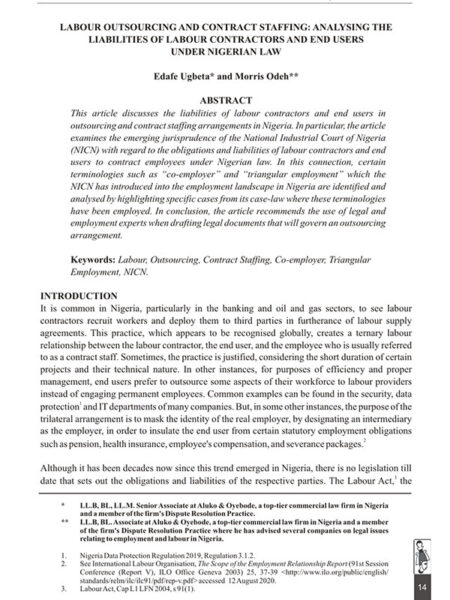
Labour Outsourcing and Contract Staffing: Analysing the Liabilities of Labour Contractors and End Users under Nigerian Law
0₦2,500.00Edafe Ugbeta and Morris Udeh of Aluko & Oyebode in their article, Labour Outsourcing and Contract Staffing: Analysing the Liabilities of Labour Contractors and End Users under Nigerian Law, >observe that generally, parties are bound by their contract, and the law does not permit the courts to alter or rewrite the terms and conditions freely agreed by the parties. However, recent decisions of the National Industrial Court of Nigeria suggest that the court may now hold end-users of labour and parent companies liable to adhere to statutory employment obligations relating to pensions, insurance, tax, health and compensation where the court considers that the labour contractor or subsidiary is a mere sham, agent, tool, or employee of the end-user/parent company for purposes of masking the identity of the real employer.
-
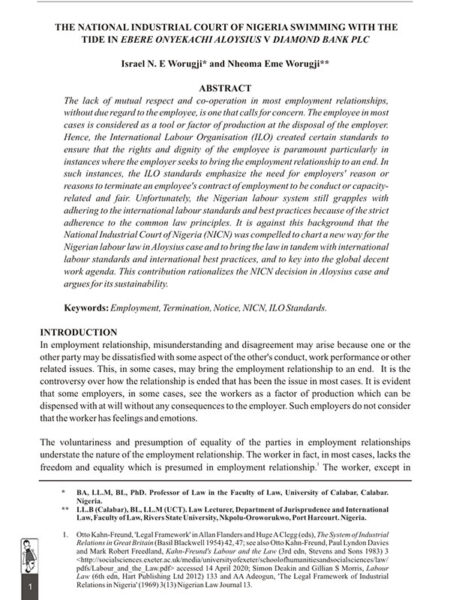
The National Industrial Court of Nigeria Swimming with the Tide in Ebere Onyekachi Aloysius V Diamond Bank Plc
0₦2,500.00Professor Israeli Worugji of the University of Calabar, Nigeria and Nheoma Worugji of the Rivers State University, Nkpolu-Oroworukwo Port Harcourt Nigeria, in their article, The National Industrial Court of Nigeria Swimming with the Tide in Ebere Onyekachi Aloysius V. Diamond Bank, note that ordinarily, an employer has the freedom to terminate the employment of an employee upon due notice and regardless of motive. The National Industrial Court of Nigeria (NICN) in a recent decision, however, seems to have limited the employer’s otherwise open-ended power to bring the contract of employment to an end. In Aloysius case, the NICN, relying on international labour standards and its new mandate under the Constitution (Third Alteration) Act, decided that no termination of a contract of employment should take place unless there is a valid reason connected with the capacity or conduct of the employee or based on the operational requirements of the establishment.Professor Israel Worugji and Nheoma Worugji review the Aloysius the case against the background of the common law and statutory provision on termination of employment, the International Labour Organisation’s instruments and international best practices.
-
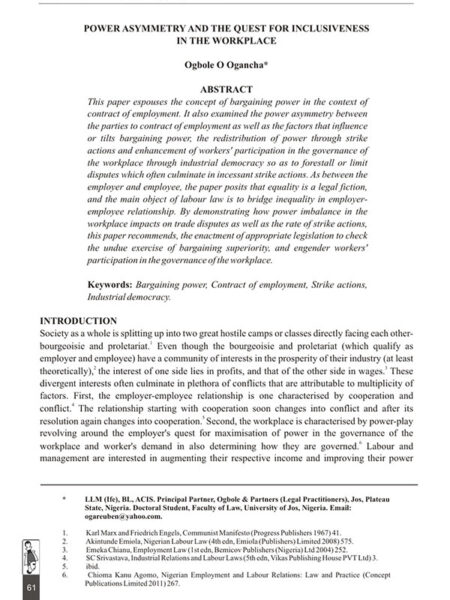
Power Asymmetry and the Quest for Inclusiveness in the Workplace
0₦2,500.00Ogbole Ogancha of Ogbole & Partners and Doctoral Candidate, Faculty of Law, University of Jos Nigeria inPower Asymmetry and the Quest for Inclusiveness in the Workplace, examines the concept of bargaining power in the context of the contract of employment. He considers the power imbalance between the parties to a contract of employment as well as the factors that influence or tilts bargaining power, the redistribution of power through strike actions and enhancement of workers’ participation in the governance of the workplace. Ogbole argues that equality in labour relations is a legal fiction, and the main object of labour law is to bridge inequality in the employer-employee relationship. Aside from demonstrating how power imbalance in the workplace impacts on trade disputes as well as the rate of strike actions, he recommends the enactment of appropriate legislation to check the undue exercise of bargaining superiority to engender workers’ participation in the governance of the workplace.
-
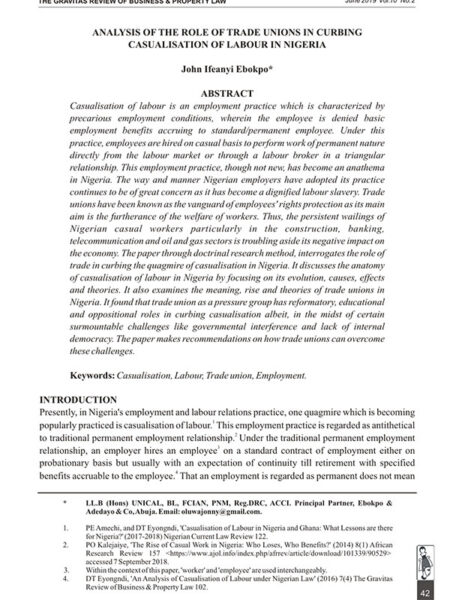
Analysis of the Role of Trade Unions in Curbing Casualisation of Labour in Nigeria
0₦2,500.00John Ebokpo in his article, Analysis of the Role of Trade Unions in Curbing Casualisation of Labour in Nigeria, examines the categories, framework, causes and effects of casualisation of labour. He considers how the reformatory, educational and oppositional roles of trade unions may curb the blight despite the unions’ lack of internal democracy and government interference in their affairs.
-
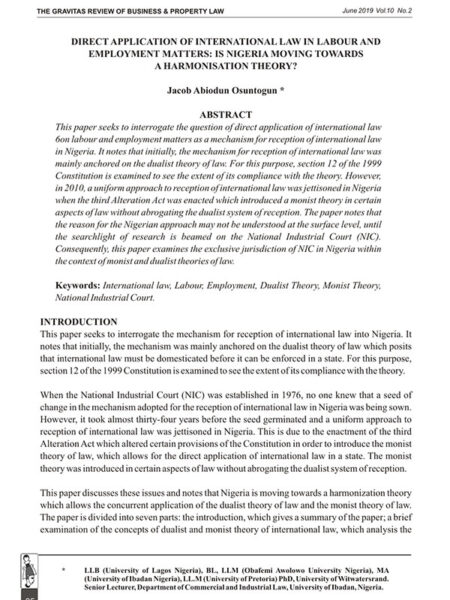
Direct Application of International Law in Labour and Employment Matters: Is Nigeria Moving Towards a Harmonisation Theory?
0₦2,500.00Dr Jacob Osuntogun, Senior Lecturer, Department of Commercial and Industrial Law, University of Ibadan Nigeria in his article, Direct Application of International Law in Labour and Employment Matters: Is Nigeria Moving Towards a Harmonisation Theory? interrogates the issue of direct application of international law in labour and employment matters in Nigeria. Ordinarily, unless international treaties and conventions are domesticated in accordance with section 12 of the 1999 Constitution, they are not applicable in Nigeria. However, section 254C (2) of the Constitution Third Alteration Act 2010 seems to have introduced a monist approach which allows a direct application of international law in labour and employment matters without abrogating the dualist system of reception of international law. Dr Osuntogun examines the dualist and monist controversy and the emergent harmonisation theory within the context of the exclusive jurisdiction of the National Industrial Court.
-
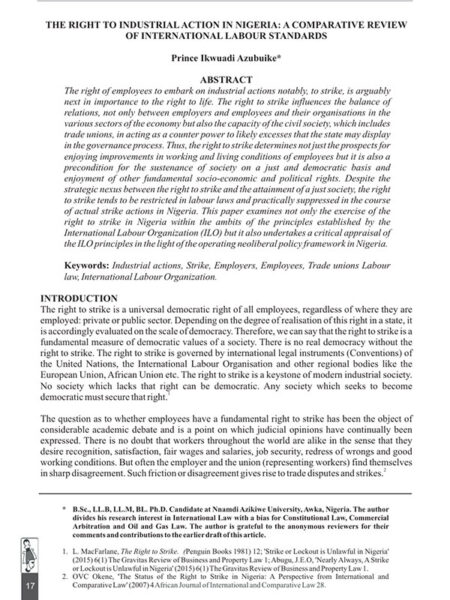
The Right to Industrial Action in Nigeria: A Comparative Review of International Labour Standards
0₦2,500.00Prince Azubuike, legal practitioner and researcher in his article, The Right to Industrial Action in Nigeria: A Comparative Review of International Labour Standards, notes that the right of employees to strike determines not just their prospects for enjoying improvements in working and living conditions, but it is also a precondition for the sustenance of a just and democratic. Despite the strategic nexus between the right to strike and the attainment of a just society, the right to strike tends to be restricted in labour laws and practically suppressed in the course of actual strike actions in Nigeria. He examines the exercise of the right to strike in Nigeria and other jurisdictions within the ambits of the principles established by the International Labour Organization (ILO).
-
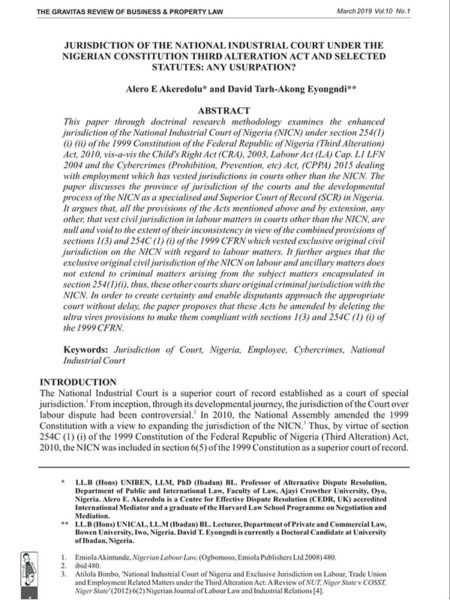
Jurisdiction of the National Industrial Court under the Nigerian Constitution Third Alteraction Act and Selected Statutes: Any Usurpation?
0₦2,500.00Professor Alero Akeredolu of Ajayi Crowther University, Oyo Nigeria and David Eyongndi of Bowen University, Iwo Nigeria in their article, Jurisdiction of the National Industrial Court under the Nigerian Constitution Third Alteration Act and Selected Statutes: Any Usurpation?, comprehensively examine the jurisdiction of the National Industrial Court. They consider whether the jurisdiction bestowed on other courts by the Labour Act, Child’s Right Act and the Cybercrimes (Prohibition, Prevention, etc.) Act in respect of employment matters contradicts the exclusive jurisdiction of the NIC under the 1999 Constitution of the Federal Republic of Nigeria (Third Alteration) Act, 2010.
-
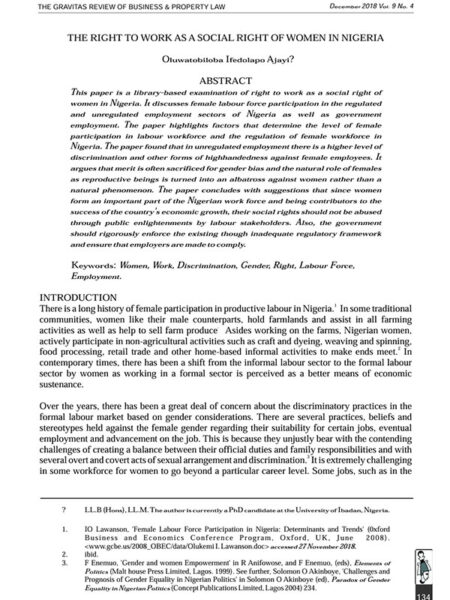
The Right to Work as a Social Right of Women in Nigeria
0₦2,500.00Oluwatobiloba Ajayi, Candidate at the University of Ibadan in her paper, The Right to Work as a Social Right of Women in Nigeria, discusses female labour force participation in the regulated and unregulated employment sectors in Nigeria. She highlights factors inhibiting advancement of women in the labour market and how laws regulating women employment in Nigeria have been inadequate. She considers employment of women in public, regulated private, and unregulated private sectors of the labour force, and concludes with recommendations on how the legal regime on employment of women could be strengthened to enhance the welfare of women employees.
-
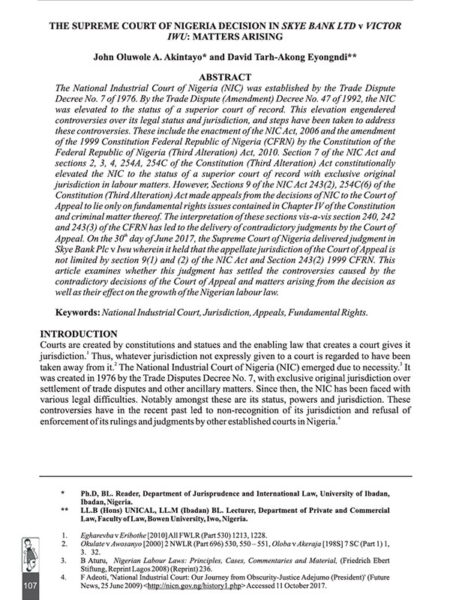
The Supreme Court of Nigeria Decision in Skye Bank Ltd v Victor Iwu: Matters Arising
0₦2,500.00John Akintayo, Reader, Department of Jurisprudence and International Law, University of Ibadan and David Eyongndi of the Department of Private and Commercial Law, Bowen University in their article, The Supreme Court of Nigeria Decision in Skye Bank Ltd. v. Victor Iwu: Matters Arising, consider the Iwu’s case as pivotal in the chequered jurisdictional history of the National Industrial Court (NIC). They analyse the relevant provisions of the NIC Act, 2006 and the Constitution of the Federal Republic of Nigeria (Third Alteration) Act, 2010. They examine the matters arising, and the unintended consequences of the decision in Iwu: that the appellate jurisdiction of the Court of Appeal to entertain appeals from the National Industrial Court is not restricted to fundamental rights issues contained in Chapter IV of the Constitution.
-
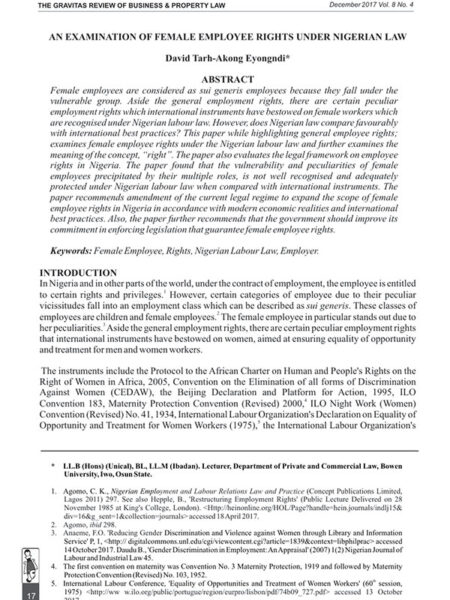
An Examination of Female Employee Rights under Nigerian Law
0₦2,500.00David Eyongndi of the Department of Private and Commercial Law, Bowen University, Iwo, in his article, “An Examination of Female Employee Rights Under Nigerian Law“, examines employment rights that are peculiar to women in Nigeria. He identifies laws and regulations that discriminate against women, and recommends an improvement in the current legal regime to expand the scope of female employee rights in Nigeria in accordance with modern economic realities and international best practices.
-
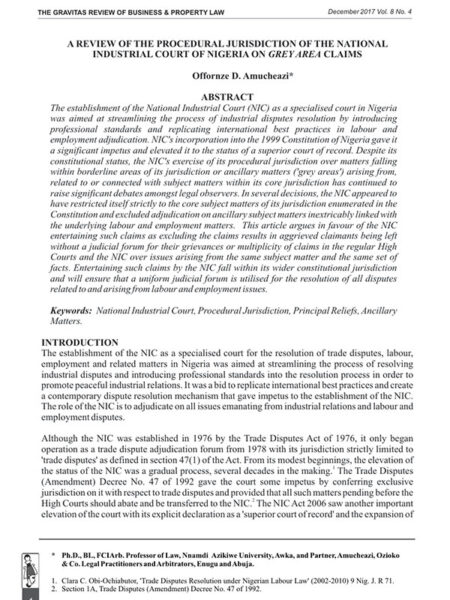
A Review of the Procedural Jurisdiction of the National Industrial Court of Nigeria on Grey Area Claims
0₦2,500.00Professor Offornze Amucheazi of Nnamdi Azikiwe University, Awka, and Partner, Amucheazi, Ozioko & Co, in his article, “A Review of the Procedural Jurisdiction of the National Industrial Court of Nigeria on Grey Area Claims”, examines the National Industrial Court’s exercise of jurisdiction over ancillary matters ‘arising from, related to or connected with’ subject matters within its core jurisdiction. He argues that despite being empowered in that regard, the NIC, from a review of several cases, appears to have restricted itself strictly to the core subject matters of its jurisdiction enumerated in the Constitution, and excluded adjudication on ancillary subject matters inextricably linked with the underlying labour and employment matters. He concludes that this cautious approach may leave aggrieved claimants without a judicial forum for their grievances, or lead to multiplicity of claims in different courts over issues arising from the same subject matter and the same set of facts.
-
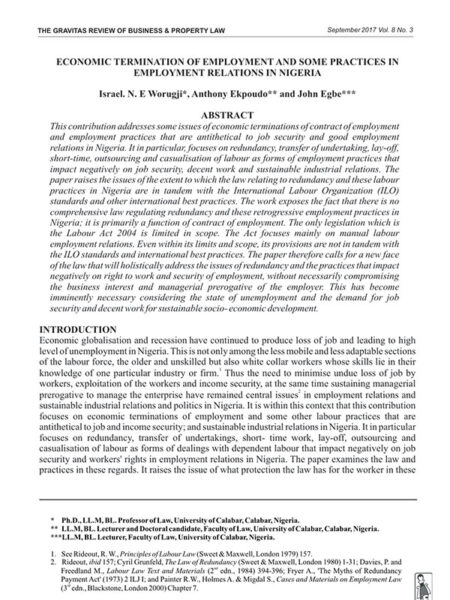
Economic Termination of Employment and some Practices in Employment Relations in Nigeria
0₦2,500.00Professor Israel Worugji, Anthony Ekpoudo and John Egbe, all of the University of Calabar in their article, “Economic Termination of Employment and Some Practices in Employment Relations in Nigeria” examine some issues of economic terminations of employment and practices that are antithetical to job security and good employment relations in Nigeria. They examine the legal framework for redundancy, transfer of undertakings, lay-off and short-time work, outsourcing and casualisation. They argue that the inadequacies of the Labour Act, and its focus on manual labour makes it short of ILO standards and international best practices. They call for a new face of the law that addresses the practices that impact negatively on the right to work and security of employment, without necessarily compromising the business interest and managerial prerogative of the employer.
The Gravitas Review of Business & Property Law



